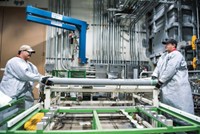Advertisement
Grab your lab coat. Let's get started
Welcome!
Welcome!
Create an account below to get 6 C&EN articles per month, receive newsletters and more - all free.
It seems this is your first time logging in online. Please enter the following information to continue.
As an ACS member you automatically get access to this site. All we need is few more details to create your reading experience.
Not you? Sign in with a different account.
Not you? Sign in with a different account.
ERROR 1
ERROR 1
ERROR 2
ERROR 2
ERROR 2
ERROR 2
ERROR 2
Password and Confirm password must match.
If you have an ACS member number, please enter it here so we can link this account to your membership. (optional)
ERROR 2
ACS values your privacy. By submitting your information, you are gaining access to C&EN and subscribing to our weekly newsletter. We use the information you provide to make your reading experience better, and we will never sell your data to third party members.
Environment
Altering a Treaty
Libya wants to convert an old weapons plant into one that makes drugs
by LOIS EMBER
October 25, 2004
| A version of this story appeared in
Volume 82, Issue 43

Libya has received support for its request to amend the 1997 Chemical Weapons Convention so that it can convert a former chemical weapons production facility into a civilian pharmaceutical plant.
The 41-member Executive Council of the Organization for the Prohibition of Chemical Weapons (OPCW), which oversees the treaty, unanimously recommended the technical change. To take effect, the request now must be considered by all nations party to the treaty. If no nation objects, the "change is considered adopted," OPCW spokesman Peter Kaiser says.
Approval is expected by December and is strongly supported by the U.S. The change is viewed as an incentive to get other nations to join the treaty. As Eric M. Javits, head of the U.S. delegation to OPCW explained at the Executive Council meeting, the change "will work not just for Libya, but for any future acceding state that may possess a chemical weapons production facility and legitimately wish to convert it for [peaceful] purposes."
As it now stands, the treaty requires all nations party to the pact to have destroyed their production facilities or to have converted them to peaceful purposes by April 29, 2003, six years after the treaty took effect in 1997. Libya, however, didn't join the treaty until this February, after it renounced its weapons of mass destruction programs in December 2003.
Libya wants to convert its Rabta facility, which once produced sulfur mustard agent, to a plant that will make low-cost drugs to treat AIDS, malaria, and tuberculosis in Africa and in other parts of the developing world. Javits said the U.S. placed "great importance" on adopting the treaty change "not only for the immediate" health benefits that will accrue, "but for the contribution it will make toward achieving universal adherence to the convention." Sixteen other nations--including the U.K. and a number of nonaligned countries--also support the amendment.
The treaty requires that the converted facility be monitored for 10 years to verify that no illicit production of chemical weapons occurs, Kaiser says.



Join the conversation
Contact the reporter
Submit a Letter to the Editor for publication
Engage with us on Twitter